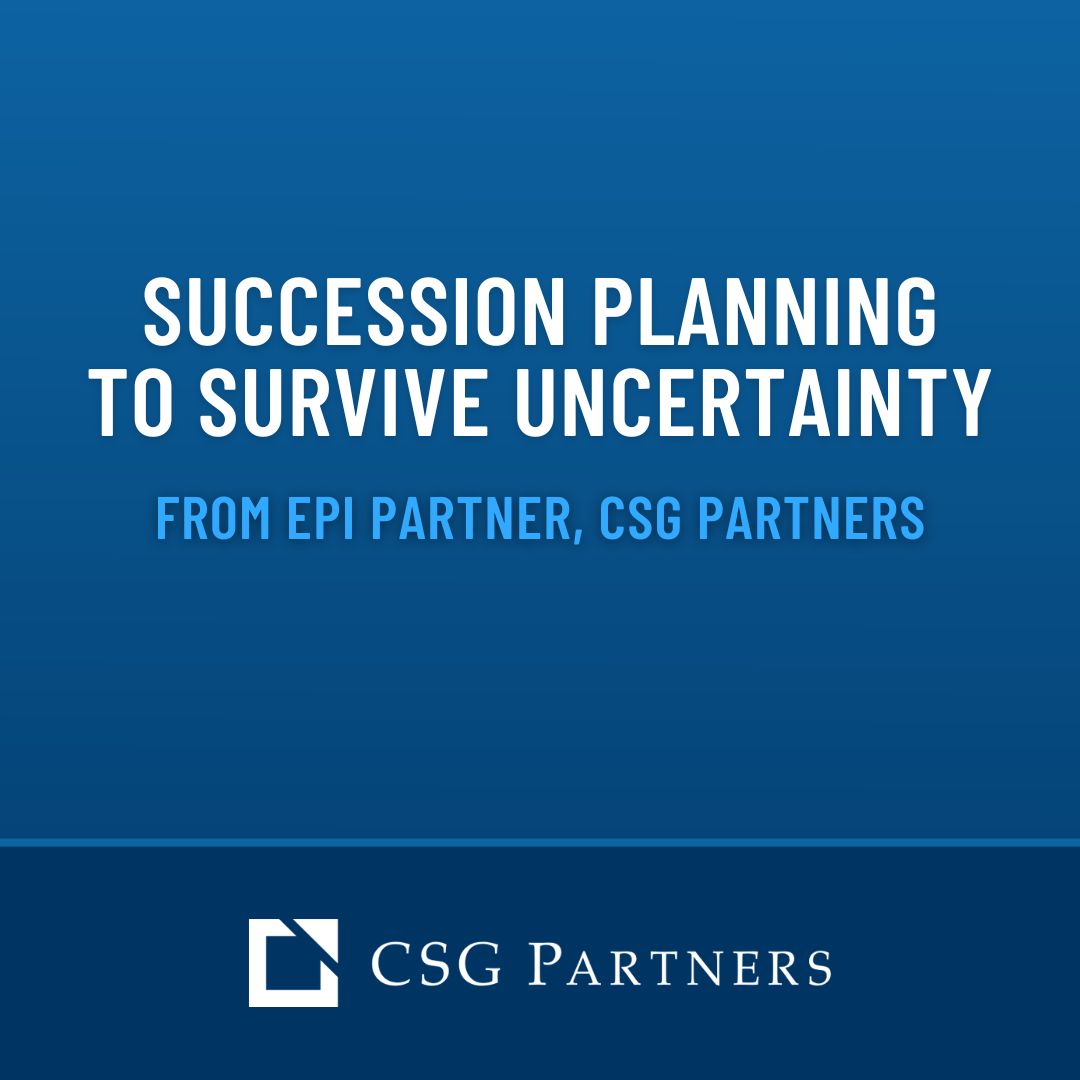
THE EXIT PLANNING BLOG
Keep up-to-date with exit planning, succession planning, industry trends, unique specialty insights, and useful content for professional advisors and business owners.
Share this
Succession Planning to Survive Uncertainty
by Richard Harmon on July 7, 2023

This article was originally published on CSG Partners website on August 30, 2022, by Richard Harmon
If the last few years have taught us anything, it’s that we can’t easily predict economic trends. From stock market gyrations, to supply chain disruption, to record inflation, it’s been an uncertain stretch for middle market companies.
For owners of family businesses, whose wealth is largely tied to their organizations, the experience has been particularly jarring. As their companies’ valuations fluctuated, many struggled to plan their own retirements and lay the groundwork for heirs to step in. Businesses without defined succession plans were particularly disadvantaged.
In 2021, only 30% of family business owners reported having a robust succession plan in place. In 2022, that number nearly doubled to 61%. Despite the apparent wake-up call, nearly two in five US family-owned companies remain exposed and in need of a clear continuity strategy. Fortunes and legacies are at stake.
Building a Succession Plan
The longevity of American family businesses might seem inevitable, but only 40% reach a second generation, and just 13% enter a third era of family stewardship. That false sense of durability can inhibit the development of a formal plan.
Generational transfers demand careful, timely consideration. A strategy that safeguards a company’s reputation, enables shareholders to plan for retirement, alleviates familial fraction, and prevents the unnecessary dilution of assets can take years to put in place.
For a family business to perpetuate and thrive in any market, early action and proper reflection on some important concepts can be critical.
1. Identify key stakeholders and potential successors.
Engage all critical players early in the planning process. Their input and buy-in are invaluable. This is a delicate process, but it’s necessary to bring the right people along for the ride.
Current owners and additional C-suite members are obvious participants. But the next generation should also have a seat at the table. Some family businesses may already have an heir apparent who’s part of the company, but that’s not always the norm.
Finding successors who can not only maintain a family business but also lead in challenging economic and competitive climates, is arguably the most crucial consideration in ensuring long-term prosperity. While a planning process shouldn’t guarantee anyone’s future with the company, it can help identify talent from within the family and beyond.
2. Understand individual goals.
Know where everyone stands and what they ultimately want – intrinsically, financially, and otherwise. That helps clarify whether the right people are actually on board.
All involved parties should be expected to at least answer the following questions:
- What are your expectations for growth within the company and/or retirement?
- What is your ideal timeline to achieve those goals?
- What is your vision for the company?
- If you currently have an ownership stake, what are your financial needs/aims?
- How/when do you foresee a potential divestiture?
Ideally, the exercise will illustrate points of alignment and help drive consensus around shared priorities.
3. Review the state of the business.
Members of a succession planning team should have at least a basic appreciation of the family business’s standing and outlook. That includes the company’s valuation, finances, core assets, key relationships, competitive set, and forecast.
This is also an opportunity to consider what makes the company unique beyond standard metrics. What brand elements and cultural attributes drive value and need to be preserved? Is the company’s identity tied to a few people or broadly internalized?
Intellectual honesty is vital in this stage. For a realistic strategy to be built, participants need to understand and trust a shared set of facts and core assumptions.
4. Envision the company’s future.
Everything leading up to this stage has been a reality check. Now the real work begins. In addition to growth targets and expansion goals, this projection should incorporate individual timelines, and the perceived talent pool, to conceptualize a mid-to-long-term future for the company.
The deliverable is a vision statement that’s aspirational yet attainable. It isn’t a fully articulated plan, but details should be concrete enough to debate, revise, and ultimately coalesce around. From here on out, the planning process is all about mapping a path to this goal.
5. Explore equity transfer options.
In addition to general business and human capital planning, a succession strategy is dependent on mechanisms to efficiently transfer equity beyond the current generation of owners.
Various options should be considered, including:
- Passing ownership via a gift or trust
- Full or partial sales of equity to family members, key employees, or outside parties
- Formalized employee sale programs such as employee stock ownership plans (ESOPs)
Each method carries its own benefits and disadvantages, but the taxability of a potential transaction often looms large. For example, private buyouts can provide substantial payouts to selling shareholders, but sales are subject to capital gains taxes.
Conversely, through December 31, 2025, a shareholder can transfer up to $12.92 million of their business ($25.84 million when combined with their spouse) to an heir without triggering gift taxes, but that’s not a liquidity event. A gift alone may leave a shareholder short of cash for retirement.
A Succession Plan is Only Valuable if it’s Implemented
A well-crafted plan is worthless if a company’s leaders don’t follow through. Clearly defined responsibilities, timelines, and performance goals are critical, but unless all parties are aligned and prepared to work toward common goals, a good effort will be wasted.
Of course, no one has a crystal ball to see future twists and turns of the market. It’s unrealistic to expect a 10 or 20-year plan that’s etched in stone. But when family-owned companies build plans that are actionable and adaptable and commit to an ongoing regimen of refinement, they’re more likely to come out ahead.
Family businesses should also consider engaging relevant professionals to help drive and optimize their succession process. Professional third parties, such as wealth advisors, tax planners, attorneys, accountants, and investment banking professionals, offer specialized expertise and can serve as impartial arbiters and sounding boards.
Plan for Success in any Economy
A multi-generational company is often a family’s biggest asset. Untying members’ personal net worth from the business, and transitioning leadership through a planned process, are keys to sustainability. A sound succession strategy, planned as early as possible, offers all stakeholders peace of mind and a better chance of enduring turbulent times.
Share this
- Blog (550)
- CEPA (433)
- exit planning (249)
- CEPA community (189)
- Business Owner (176)
- Exit Planning Summit (100)
- EPI Chapter Network (89)
- Value Acceleration Methodology (81)
- Exit Planning Partner Network (76)
- EPI Announcement (50)
- Content (48)
- Webinars (37)
- Excellence in Exit Planning Awards (34)
- Marketing (30)
- 2024 Exit Planning Summit (28)
- 5 Stages of Value Maturity (26)
- Books (24)
- EPI Academy (24)
- EPI Team (22)
- Exit Planning Teams (22)
- Leadership (21)
- 2023 Exit Planning Summit (20)
- family business (20)
- women in business (19)
- Intangible Capital (18)
- Exit Options (17)
- Black Friday (16)
- CPA (15)
- Walking to Destiny (15)
- Chapters (14)
- State of Owner Readiness (14)
- charitable intent (13)
- Chris Snider (12)
- National Accounts (12)
- Small business (12)
- personal planning (12)
- Financial Advisors (11)
- Season of Deals (9)
- 5 Ds (8)
- About us (8)
- Podcast (8)
- Scott Snider (8)
- Insiders Bash (7)
- Christmas (6)
- Exit Planning Content Library (6)
- Case Studies (5)
- Owner Roundtables (5)
- Three Legs of the Stool (5)
- Value Advisors (5)
- financial planning (5)
- Awards (4)
- Circle of Excellence (4)
- DriveValue (4)
- EPI Thought Leadership Council (4)
- Exit & Succession (4)
- Five Ds (4)
- executive training (4)
- Owners Forum (3)
- author (3)
- forbes (3)
- Exit Is Now Podcast (2)
- Peter Christman (2)
- Veteran (2)
- Whitepapers (2)
- Annual Exit (1)
- Business Owners Forum (1)
- SOOR (1)
- business consultants (1)




.jpg)

